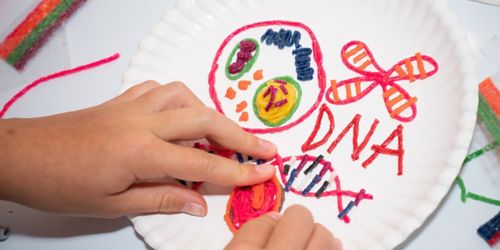St. Jude Family of Websites
Explore our cutting edge research, world-class patient care, career opportunities and more.
St. Jude Children's Research Hospital Home

- Fundraising
St. Jude Family of Websites
Explore our cutting edge research, world-class patient care, career opportunities and more.
St. Jude Children's Research Hospital Home

- Fundraising
Cancer predisposition: early conversations set expectations for future findings

Conversations with patients about cancer predisposition and future considerations should happen early on to prevent future confusion.
Understanding of genes and a person’s predisposition for diseases such as cancer changes as we learn more. While the evolution aids understanding, diagnosis and treatment of disease, it can also create ethical issues for families and patients. These issues may resonate for generations.
The Pediatric Cancer Genome Project has dramatically increased our understanding of childhood cancer. Genomes for Kids (G4K), a research study that followed on the project’s success, aims in part to improve how we communicate that knowledge to patients and families.
The Pediatric Cancer Genome Project was launched in 2010 by St. Jude Children’s Research Hospital and the Washington University School of Medicine in St. Louis. The goal was to understand and identify the genetic origins of some of the most aggressive and least understood cancers. The complete normal and cancer genomes of about 800 children with 23 different types of cancer were sequenced. Scientists also sequenced the whole exome and whole transcriptome of an additional 1,200 patients.
Among the findings was evidence that nearly 1 in 10 children with cancer were born with genetic changes (mutations) that increased their cancer risk.
But more genomic information, including findings from whole genomic sequencing, can be overwhelming for families and patients. As our understanding of cancer predisposition evolves, so do the questions and ethical issues facing patients and families.
Genomes for Kids
G4K is a legacy of the Pediatric Cancer Genome Project. The study looks for genetic mutations in the DNA of patients’ germline (healthy tissue) rather than tumor DNA. The current screening checks for 150 known cancer predisposition genes. That number will likely continue to increase as additional predisposition genes are identified.
The main goal of G4K is to advance our understanding and treatment of childhood tumors. G4K offers testing for cancer predisposition genes to newly diagnosed St. Jude cancer patients. Researchers hope the finding will help to pinpoint the specific gene changes that drive cancer.
Armed with those details, scientists will be able to understand more about why the tumors formed and learn how to treat them better.
Our understanding of germline mutations and cancer risk will change as whole genome sequencing continues and analytic tools increase. Some genomic changes will be recognized as benign. For others, the risk will remain uncertain or be categorized as pathogenic or likely pathogenic.
Clear communication of cancer predisposition
Against this backdrop, what do patients and their families expect from researchers?
To find out, my colleagues and I surveyed patients and parents enrolled in G4K.
We learned that most parents and teens want updates as information and understanding of germline results changes. The expectations aren’t limited by the passage of time or a child’s death. However, nearly one-third of parents were either uncertain or did not want to be contacted as information becomes available.
The message? Clinicians must be clear with patients and families about plans for retesting genomic samples in the future or updating results as new information becomes available. That includes using clear communication to explain which screening results will be returned. Researchers must also align patient and family expectations about future updates.
This way, trust is maintained and there are clear instructions on what to do when new information is discovered.






